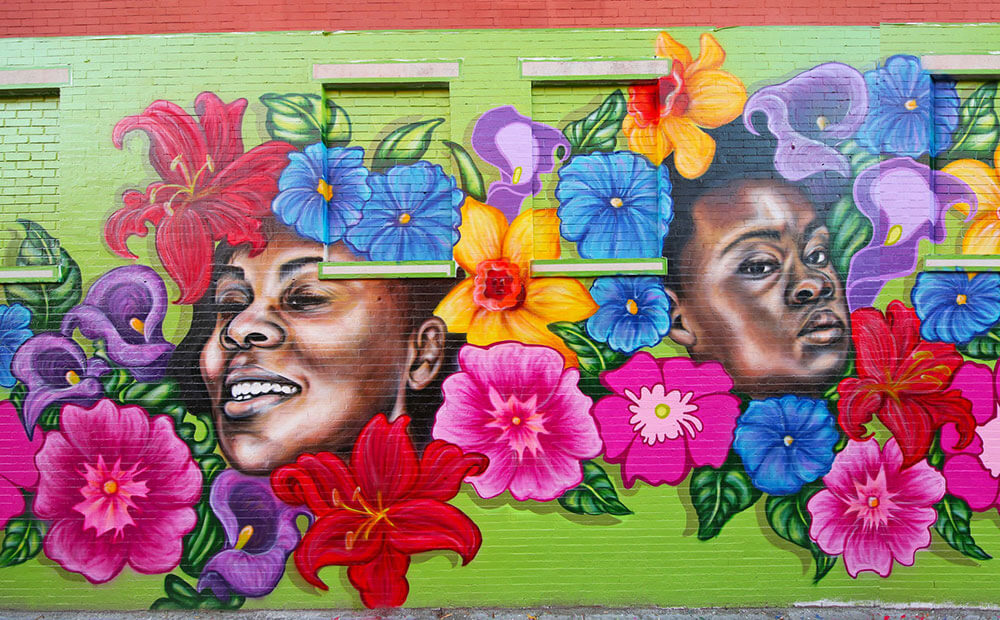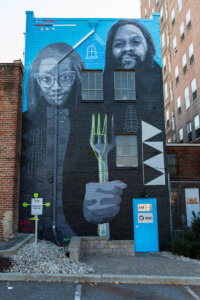
Girls for a Change, a Virginia-based organization empowering girls of color, partnered with Richmond muralist Hamilton Glass on this street art project. (Photos courtesy Richmond Region Tourism)
When several conferences that were booked to meet in person in Richmond, Virginia, in the first quarter of 2021 were moved online, their organizers asked the CVB to brainstorm creative ways to make the destination a part of their virtual program, said Liana Acevedo, CMP, senior convention services manager for Richmond Region Tourism. These were events that chose Richmond with plans to incorporate its specific attributes into their educational programming.
For example, the 2021 River Management Society’s (RMS) Symposium was scheduled to use the James River’s resurgence as the city’s environmental, economic, and cultural centerpiece as a case study. Now that RMS’s April 12-15 symposium will be held entirely online, the James River will still figure prominently in the program, with a keynote by local speakers — Nathan Burrell, the former superintendent of the James River Park System and current deputy director of the Virginia Department of Conservation and Recreation, and Virginia Commonwealth University professor and James River historian Ralph Hambrick.

The Mending Walls project, started in Richmond in 2020 by artist Hamilton Glass, uses public art as an opportunity for conversations about race and equity to happen. “African American Gothic” was created by mural artists Andre Shank and Sone Sereé.
Likewise, Richmond’s history with the railroad and trolleys led WTS International, which advances women professionals in the transportation industry, to book the destination for its 2021 annual conference, May 10-14. “The conference will remain the Richmond, Virginia conference, but will be reformatted to take place virtually,” according to the WTS virtual annual conference website. Acevedo said that the CVB is “collaborating with our partners, like the Richmond Railroad Museum, to help create brief snippets — 10-15 minutes of tour experiences that attendees can watch on their own within the event platform, and then offer the option for a Q&A with an expert later in the program.”
But Richmond’s appeal for groups goes beyond its physical attributes and infrastructure. The city’s identity is bound to Black history in America — it was the center of the domestic slave trade in North America, home to “Harlem of the South,” and a gateway to Black culture. As organizations seek to make themselves and the industries and professions they represent more diverse — the first track topic listed on WTS’s event website is ingraining equity and inclusion in workplace culture — they are leveraging that history.
Burrell, who is Black, also will help lead an RMS workshop on diversity in the workplace. As part of participants’ virtual experience, RMS also was working with the National Park Service to give them a virtual history field trip of the Maggie L. Walker National Historic Site. Walker was a civil rights activist, educator, and advocate for Black economic independence, who in 1903 became the first Black woman in the U.S. to charter a bank. RMS’s plan, unfortunately, had to be scrapped — due to COVID, the museum remains closed.
But the destination offers plenty of other opportunities to help educate virtual audiences on the Black experience in America, including a virtual history tour of the Richmond Slave Trail and Monument Avenue — where a Robert E. Lee memorial statue has become one of the focal points of the racial justice movement over the past year — and a series of videos produced by the American Civil War Museum, which seeks to explore the war through many voices, women and people of color from the North and South among them. An additional virtual offering is “Hidden in Plain Site,” a guided, interactive tour of distinct, but easy-to-overlook sites around Richmond that tells the story of the Black experience throughout the city’s history.
Another way to bring a piece of Richmond into attendees’ homes is Richmond Night Market, a virtual experience that focuses on the city’s multicultural artisans and vendors, Acevedo said. She added that the CVB is also looking for ways to encourage virtual event attendees to shop online with local makers.
“In a normal world,” Acevedo said, groups would have gone outside “for these tour activities when they were here. As those events were moved online, organizers wanted to still keep that field trip element virtually. All of these pieces really are to drive that Richmond experience that they would have gotten if they were here in person.”
Michelle Russell is editor in chief of Convene.
